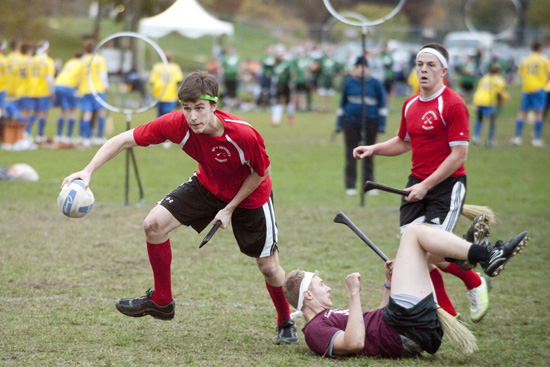Quidditch, Almost at the Olympics
Recent alum plays in England for U.S. team

BU quidditch players Kedzie Teller (COM’12) (right) and Brendan Stack (CAS’14) were both nominated to play for Team USA in the Quidditch Summer Games, July 8 and 9 in Oxford, England. Photo by Max Belin (COM’14)
When Kedzie Teller discovered he would be playing for Team USA in the Quidditch Summer Games in Oxford, England, his screams woke the neighbors.
“I made a deal with another nominee that we would tell each other the moment we heard something,” says Teller (COM’12). “She called to tell me to go check out the list, and I started screaming when I saw my name on there. My neighbors probably thought I was being attacked.”
Teller is one of 21 U.S. players who will compete this Sunday and Monday in the first-ever competition of national quidditch teams, which includes squads from the United States, France, Canada, the United Kingdom, and Australia. And while the competition is not part of the London 2012 Olympics—which begins July 27—two finalists from the tournament will participate in a quidditch demonstration match on July 9, during Oxford’s Olympic torch relay festival. Organized by the International Quidditch Association (IQA), the two-day tournament is yet another indication that the six-year-old sport of quidditch will be around for a while.
The game first appeared on the pages of J. K. Rowling’s popular Harry Potter series, and came to modern life at Middlebury College in 2005. Since then the sport has expanded to roughly 300 universities and high schools around the world, according to the IQA. The 2011 Quidditch World Cup, held on Randall’s Island near Manhattan last November, drew 96 teams, some traveling from as far as Finland.
The BU team, founded in 2008, is one of the top-ranked teams in the country. It came within two games of winning the 2011 World Cup, falling to world champion Middlebury.
The team has begun the process of becoming an official club sport, which would make funding available for coaches and other benefits. During the school year, more than 100 students come out to play every Sunday on the BU Beach, rain or shine.
Teller, one of five captains of the 2011–2012 BU team, predicts that the summer games in Oxford will do much to boost the profile of the sport. “I signed a few autographs today,” he says. “That’s pretty cool, right?”
He says that players chosen for the summer games were first nominated by team captains, then selected for the official team by an IQA committee, based on factors such as experience and notoriety. Players were chosen from schools across the country, among them Emerson, Villanova, and the University of Texas. Each position has an alternate in case a first-pick player cannot go. One of the alternates is Brendan Stack (CAS’14).
Was he disappointed? “It was an honor to be chosen at all,” Stack says. “It would have been awesome to play quidditch in London, so I was a little disappointed that I didn’t make the final cut. But I’m only going into my junior year, so I still have some time left to make the team in the future.”
One of the challenges Teller faced was not athletic: raising money for travel expenses. Through Facebook, Twitter, and LinkedIn, the recent public relations graduate managed to raise $1,700, courtesy of friends, family, and even fellow BU alumni. The IQA also sold jerseys with the players’ names to raise funds for the team.
Teller says the games are a wonderful way to end his college quidditch career, and he is fairly certain he’ll be flying home with a gold medal.
“The United States is definitely the team to beat,” he says. “Our big competitor is the UK, and they haven’t been playing that long. Here, the stars from each of the big teams were picked to play, but the UK had to have tryouts and some of their players were playing for the first time in their lives. We’re like the dream team.”
Comments & Discussion
Boston University moderates comments to facilitate an informed, substantive, civil conversation. Abusive, profane, self-promotional, misleading, incoherent or off-topic comments will be rejected. Moderators are staffed during regular business hours (EST) and can only accept comments written in English. Statistics or facts must include a citation or a link to the citation.